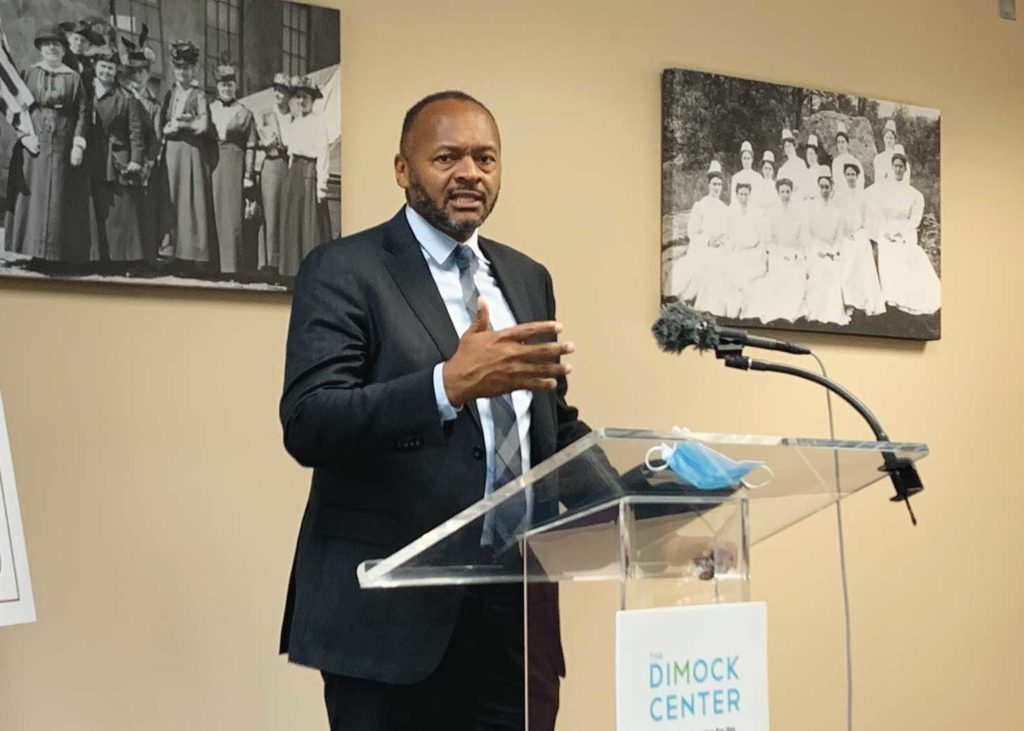Calculating the cost of health inequity
Study seeks to quantify healthcare disparities

After years of urging an end to racial inequity in healthcare for the sake of moral good, a coalition of industry leaders in Massachusetts are taking a new approach: dollars and cents.
A study commissioned by the Blue Cross Blue Shield of Massachusetts Foundation aims to determine the financial impact of racial disparities in care, a crisis exacerbated by the COVID-19 pandemic.
“The injustice and inequity exists no matter where you look, the data tell us clearly that the playing field is not equal,” Dr. Joan Reede, a Harvard Medical School professor, told a gathering of 40 Black and Latino healthcare leaders at a meeting Monday at the Dimock Center in Roxbury. “And for many, it’s worsening.”
Racial health disparities result in significant economic losses nationally, including an estimated $35 billion in excess health care expenditures, $10 billion in illness-related lost productivity, and nearly $200 billion in premature deaths.
In Massachusetts, non-Hispanic Black residents were nearly twice as likely to rely on emergency rooms for care as compared to non-Hispanic white residents; Hispanic residents were nearly three times as likely, according to the Massachusetts Center for Health Information and Analysis.
The COVID-19 pandemic “magnified the preexisting disparities and exacerbated those vulnerabilities” for communities of color, said Dr. Charles Anderson, the president and CEO of the Dimock Center.
“This pandemic had a devastating and unequal impact on communities of color,” Anderson said. “We’re talking about more cases, more hospitalizations and more deaths than any other community in the commonwealth.”
Black residents were 2.4 times more likely to be hospitalized and 2.1 times more likely to die from COVID-19 than their white counterparts, and Hispanic residents were 1.6 times more likely to be either hospitalized or die from the virus, according to the Massachusetts Department of Health.
“The social determinants of health are at play, but racism and discrimination and exclusion are also at play,” Reede said. “COVID did not create this. COVID was built on this.”
In addition to funding the study with a goal of publishing by the end of this year, Blue Cross Blue Shield of Massachusetts will release a set of policy goals, set to publish in November, focusing on the role of health institutions and state government agencies, according to BCBS Executive Vice President Manny Lopes.
The proposal will include capacity and diversity in the healthcare industry, attracting, supporting and continuing to train Black and brown employees, an expansion of MassHealth to vulnerable communities and a redesign of the healthcare payment system “so it rewards for health equity and addresses gaps such as behavior health and health-related social needs like food access, affordable housing, transportation and health care,” Lopes said.
The aim of the financial study is to position racial equity as a financial incentive for businesses in the health industry, said Michael Curry, the president and CEO of the Massachusetts Community League of Health Centers.
“You’ve got to tap into whatever motivates people to change policy … what moves one person may not necessarily move someone else, but dollars and cents matter,” Curry said. “I would love to be able to walk in a room and say that people are dying, and have everyone get behind that movement and address that issue. But that’s not how people work, unfortunately. That’s not how policy changes.”
Tori Bedford covers Dorchester, Roxbury and Mattapan for GBH, 89.7.






